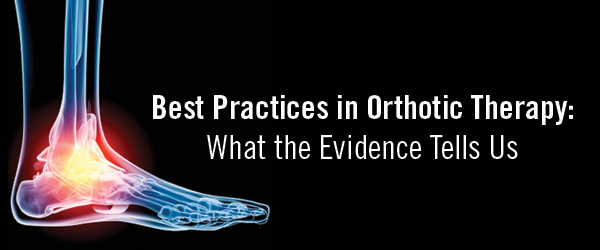Best Practices in Orthotic Therapy: What the Evidence Tells Us
Des Moines, IA US
April 11, 2015

| Registration |
|---|
You must login or create an account before registering for this course.Once you're logged in, please click on the "ENTER" button to your right. Your attendance will then be confirmed. |
Target Audience
Podiatric physicians, physical therapists, orthotists, and other health care providers providing biomechanics and orthotic treatment to patients.
Agenda
- Evidence-Based Foot Orthotic Therapy: A Pathology-Specific Approach
Derive superior clinical outcomes, greater patient satisfaction, and build a more successful orthotic therapy practice. This portion of the program will incorporate current research, relevant literature, and advancements in biomechanics and orthotic therapy to help you develop the best orthotic prescription based on the specific pathology.- Recent Advances in Orthotic Therapy for Plantar Fasciitis
- Could this Research Change the Way You Treat Hallux Limitus?
- Top 5 Tips for Treating Metatarsalgia with Foot Orthoses
- Evidence-Based Pediatric Flatfoot Treatment: What Should You Be Doing?
- Orthotic Troubleshooting and In-Office Modifications
Learn how to systematically evaluate, prevent, and treat common orthotic problems. This practical presentation will help attendees improve clinical outcomes while decreasing time spent adjusting orthoses.
- Comparison of Digital Casting Technologies
This presentation reviews the technology options related to foot orthotic casting, and compares each to negative suspension casting and to each other. Learn the advantages and disadvantages of the devices currently available in the podiatric market so that you can make an informed decision on adding digital casting to your practice.
- Foot Orthoses to Prevent Diabetic Ulceration: Managing Pressure and Friction
Managing the forces that lead to ulceration in the diabetic patient is not as simple as reducing pressure. More and more evidence points to friction as a primary causative factor in ulcer formation. In this lecture we will evaluate the current evidence regarding ulcer prevention and recommend specific orthotic modifications to provide the best clinical outcomes.
Speakers
- Paul Dayton, DPM, MS, FACFAS
Assistant Professor, College of Podiatric Medicine and Surgery, Des Moines University
Dr. Dayton indicated he has no financial relationships to disclose relevant to the content of this CME activity.
- Larry Huppin, DPM
Medical Director, ProLab Orthotics
Biography
Relevant to the content of this CME activity, Dr. Huppin indicated he is an employee of ProLab Orthotics.
Continuing Education Credit
Des Moines University is approved by the Council on Podiatric Medical Education as a provider of continuing education in podiatric medicine. Des Moines University has approved this activity for a maximum of 3.0 continuing education contact hour(s).
No commercial interest provided financial support for this continuing education activity.
Des Moines University
Munroe Building
3200 Grand Avenue
Des Moines, IA
50312
United States
Available Credit
- 3.00 CE Contact Hour(s)
- 3.00 CPME
Price
Cost:
$0.00
Please login or Create an Account to take this course.

 Facebook
Facebook X
X LinkedIn
LinkedIn Forward
Forward